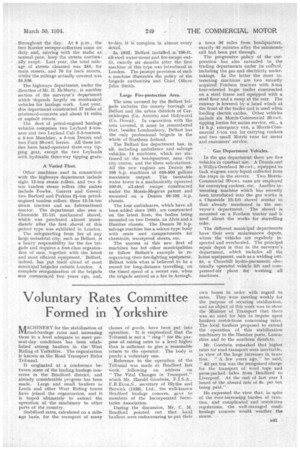Voluntary Rates Committee Formed in Yorkshire
Page 47

If you've noticed an error in this article please click here to report it so we can fix it.
fiACHINERY for the stabilization of IV/road-haulage rates and increasing them to a level adequate to meet present-day conditions has been established among hauliers in the West Riding of Yorkshire. The organization is known as the Road Transport Rates Tribunal.
It originated at a conference between some of the leading haulage concerns in the Bradford district, and already considerable progress has been made. Large and small hauliers iii Leeds and other West Riding towns have joined the organization, and it is hoped ultimately to extend the operation of the machinery to other parts of the country.
Stabilized rates, calculated on a mile-. age basis, for the transport of many
classes of goods, have been put into operation. It is emphasized that the Tribunal is not a " ring" for the purpose of raising rates to a level higher than is sufficient to give a reasonable return to the operator. The body is purely a voluntary one.
Reference to the operation of the Tribunal was made at Bradford last week, following an address on " The Vital Changes in Transport," which Mr. Harold Goodwin, F.I.S.A,, F.R.Econ.S1, secretary of Blythe and Berwick (1928), Ltd., the well-known Bradford haulage concern, gaVe to members of the Incorporated. Secretaries Association.
During the discussion, Mr. C. M. Bradford pointed out that local hauliers were endeavouring to put their own house in order with regard to rates. They were meeting weekly for the purpose of securing stablization, and an object of this work was to show the Minister of Transport that there was no need for him to impose upon hauliers restrictions concerning rates. The local hauliers proposed to extend the operation of this stabilization machinery to the Humber ports, Lancashire and to the southern districts.
Mr. Goodwin remarked that higher rates for road transport were inevitable, in view of the large increases in taxa-tion. " A few years ago," he said " £.2 per ton was the recognized charge for the transport of wool tops and press-packed bales from Bradford to Liverpool. At the end of last year I heard of the absurd rate of Ss. per ton being paid.".
He He expressed the view that, in spite of the ever-increasing burden of taxation, and complicated and restrictive regulations, the well-managed roadhaulage concern Would weather tho storm. •












































































